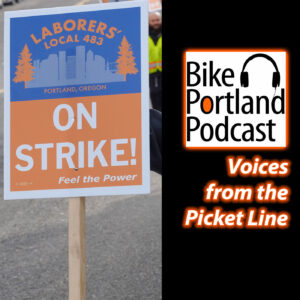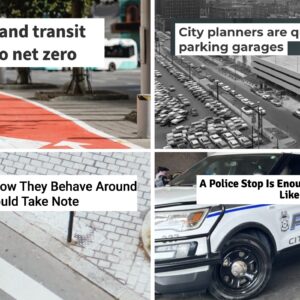There’s an interesting dichotomy in many conversations around transportation safety. Should the push for safer roads focus of driver behaviors or the design of our roads?
Obviously, the answer is a combination of both, but what should the balance be?
Government agencies and transportation departments are the ones who usually push the idea that the terrible safety outcomes we have are the fault of how people drive — not the streets they drive on. And who can blame DOTs for pushing the individual responsibility narrative? After all, streets are their work product: they could face legal liability if they’re found to be inherently unsafe and public ridicule of they’re poorly designed.
We hear from many advocates that the infrastructure itself is to blame. Transportation nonprofit groups in the U.S. have long made things like bike lanes the focus of their campaigns and have promised us that better infrastructure will lead to safer behaviors, less deaths, and so on.
This “systems versus people” debate is one of the things I explored with Dr. Tara Goddard in the latest episode of our podcast. Dr. Goddard has a doctorate in urban planning from Portland State University and is currently an assistant professor in the School of Urban Planning at Texas A & M University. One of the focus areas of her research is car culture and how implicit bias impacts the way people drive.
Some highlights of this episode include:
- How to improve the police-to-media information pipeline.
- Dr. Goddard’s interesting research
- Her idea to copy the “safe sex” approach to fighting AIDs to driving
- Whether it’s smart to use the phrase “traffic violence”
- What is the right balance in the “systems vs people” debate
You can find the episode on every major podcast platform. Thanks for listening!







Thanks for reading.
BikePortland has served this community with independent community journalism since 2005. We rely on subscriptions from readers like you to survive. Your financial support is vital in keeping this valuable resource alive and well.
Please subscribe today to strengthen and expand our work.
Outstanding interview with an insightful researcher working on the leading edge of transportation transformation. Thanks, Jonathan!
The idea that “story telling” or awkward sex metaphors are sufficient to begin to change our autonormative society is absurd and ahistorical. Dutch protesters did not tell stories to effect change — they blocked roads, called out drivers, and destroyed cars.
This type of “semantic” advocacy is an example of how those who fear societal disruption fixate on reform that feels good but does little to challenge the system.
What will allow our society to change is a combination of economic incentives and palatable alternatives.
No one said that “story telling” or awkward sex metaphors were sufficient to to begin to change.
Nice interview. I spend a good chunk of every day out walking, running, and cycling on the roads, and I’m always amazed at how a few drivers prioritize *MY* safety but most drive as though the person outside the car (me) doesn’t exist.
The other day when I was walking the dog, a woman slowed her car to around 5 mph as she passed me on a street with no sidewalk. What causes such behavior? And how can it be replicated throughout the population?
I’m sure that how drivers are socialized into driving plays a big role in how they react to people outside of their cars. How many young people drive carefully during driver ed (when they have to, to pass the class) and then go tearing off by themselves when class is over?
Maybe when every car is equipped with cameras, drivers can earn points on their license for every situation in which they fail to slow down for people outside of their cars.